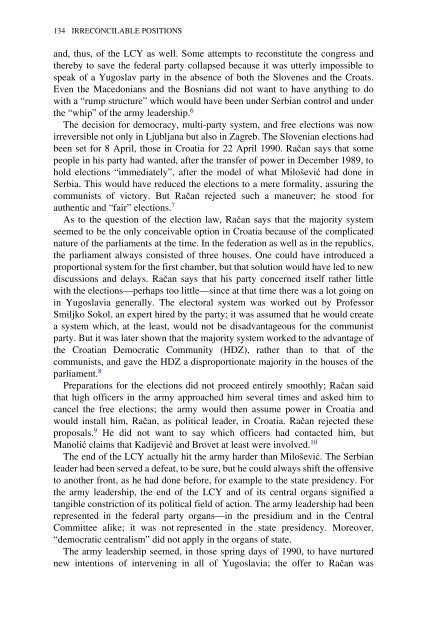Yugoslavia: A History of its Demise - Indymedia
Yugoslavia: A History of its Demise - Indymedia
Yugoslavia: A History of its Demise - Indymedia
You also want an ePaper? Increase the reach of your titles
YUMPU automatically turns print PDFs into web optimized ePapers that Google loves.
134 IRRECONCILABLE POSITIONS<br />
and, thus, <strong>of</strong> the LCY as well. Some attempts to reconstitute the congress and<br />
thereby to save the federal party collapsed because it was utterly impossible to<br />
speak <strong>of</strong> a Yugoslav party in the absence <strong>of</strong> both the Slovenes and the Croats.<br />
Even the Macedonians and the Bosnians did not want to have anything to do<br />
with a “rump structure” which would have been under Serbian control and under<br />
the “whip” <strong>of</strong> the army leadership. 6<br />
The decision for democracy, multi-party system, and free elections was now<br />
irreversible not only in Ljubljana but also in Zagreb. The Slovenian elections had<br />
been set for 8 April, those in Croatia for 22 April 1990. Račan says that some<br />
people in his party had wanted, after the transfer <strong>of</strong> power in December 1989, to<br />
hold elections “immediately”, after the model <strong>of</strong> what Milošević had done in<br />
Serbia. This would have reduced the elections to a mere formality, assuring the<br />
communists <strong>of</strong> victory. But Račan rejected such a maneuver; he stood for<br />
authentic and “fair” elections. 7<br />
As to the question <strong>of</strong> the election law, Račan says that the majority system<br />
seemed to be the only conceivable option in Croatia because <strong>of</strong> the complicated<br />
nature <strong>of</strong> the parliaments at the time. In the federation as well as in the republics,<br />
the parliament always consisted <strong>of</strong> three houses. One could have introduced a<br />
proportional system for the first chamber, but that solution would have led to new<br />
discussions and delays. Račan says that his party concerned <strong>its</strong>elf rather little<br />
with the elections—perhaps too little—since at that time there was a lot going on<br />
in <strong>Yugoslavia</strong> generally. The electoral system was worked out by Pr<strong>of</strong>essor<br />
Smiljko Sokol, an expert hired by the party; it was assumed that he would create<br />
a system which, at the least, would not be disadvantageous for the communist<br />
party. But it was later shown that the majority system worked to the advantage <strong>of</strong><br />
the Croatian Democratic Community (HDZ), rather than to that <strong>of</strong> the<br />
communists, and gave the HDZ a disproportionate majority in the houses <strong>of</strong> the<br />
parliament. 8<br />
Preparations for the elections did not proceed entirely smoothly; Račan said<br />
that high <strong>of</strong>ficers in the army approached him several times and asked him to<br />
cancel the free elections; the army would then assume power in Croatia and<br />
would install him, Račan, as political leader, in Croatia. Račan rejected these<br />
proposals. 9 He did not want to say which <strong>of</strong>ficers had contacted him, but<br />
Manolić claims that Kadijević and Brovet at least were involved. 10<br />
The end <strong>of</strong> the LCY actually hit the army harder than Milošević. The Serbian<br />
leader had been served a defeat, to be sure, but he could always shift the <strong>of</strong>fensive<br />
to another front, as he had done before, for example to the state presidency. For<br />
the army leadership, the end <strong>of</strong> the LCY and <strong>of</strong> <strong>its</strong> central organs signified a<br />
tangible constriction <strong>of</strong> <strong>its</strong> political field <strong>of</strong> action. The army leadership had been<br />
represented in the federal party organs—in the presidium and in the Central<br />
Committee alike; it was not represented in the state presidency. Moreover,<br />
“democratic centralism” did not apply in the organs <strong>of</strong> state.<br />
The army leadership seemed, in those spring days <strong>of</strong> 1990, to have nurtured<br />
new intentions <strong>of</strong> intervening in all <strong>of</strong> <strong>Yugoslavia</strong>; the <strong>of</strong>fer to Račan was
















